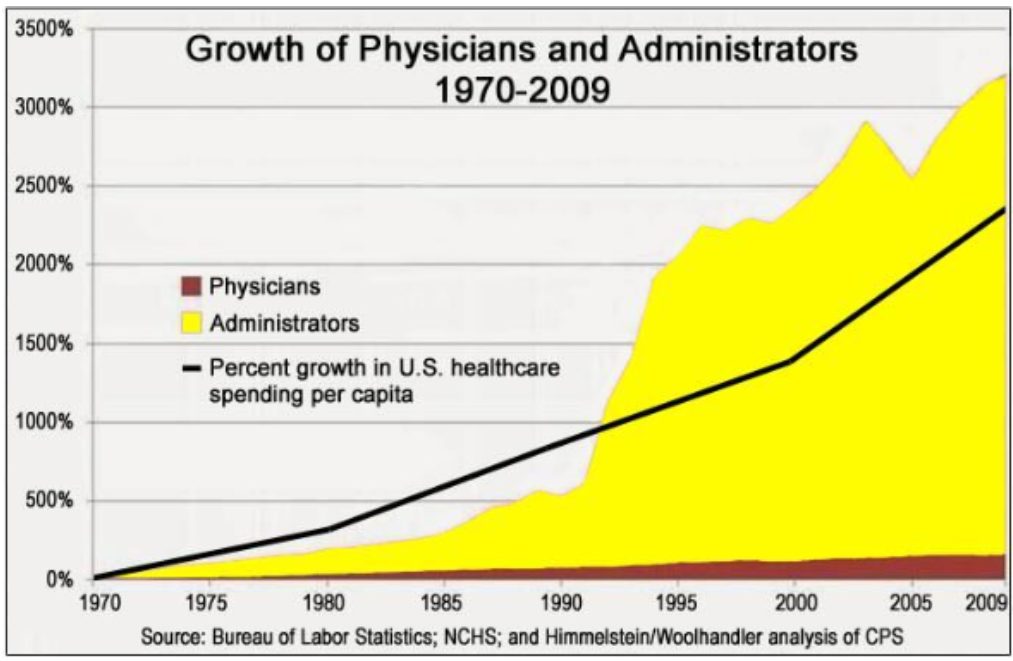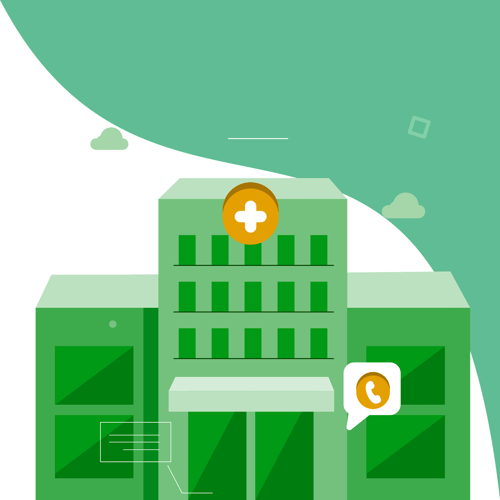Our Healthcare Software Development Services
What Healthcare Software Development Services Do We Offer?
Looking for assistance in healthcare software development? You’re in the right place. Vitamin Software is your trusted consultant and technical partner. We excel in regulated industries where compliance, reliability, and timeliness are paramount.
Keep reading to learn about our healthcare SaaS development services, expertise, goals, and guarantees.
Why Healthcare SaaS?
Hospital administrator numbers have spiked in recent years, while the physician workforce saw a slight rise, as you can see on the graph below. And who carries the weight of this imbalance? Doctors and patients.
Healthcare software development seeks to balance the numbers, reducing the operational requirements of running a hospital, clinic, or provider service. That way, more people and funds can go toward the core goal of this field — helping improve patient outcomes.

It’s amazing that people who think we cannot afford to pay for doctors, hospitals, and medication, somehow think that we can afford to pay for doctors, hospitals, medication, and a government bureaucracy to administer it’
— Thomas Sowell, American economist
Vitamin's Approach
When working with tech companies in healthcare, we focus on bringing these benefits:
Better operational efficiency
There’s a constant need for more medical staff in countries like the US, EU, UK and CA (and it’s becoming more of a global issue). Healthcare SaaS boosts operational efficiency, letting providers make better use of the available resources. It takes over time-consuming tasks like record-keeping and scheduling, so administrative staff have time for work that requires a human touch.
Data-driven decision-making
Compliance and security
One of the biggest challenges of healthcare SaaS products is interoperability with other highly secured, regulated systems. For example, it’s not enough to have insurance claims software that displays only your claims — it must also connect with other tools to be processed in the healthcare ecosystem. Organizations that operate with healthcare information must comply with various standards like this one, and software makes it easier to do. It protects sensitive information while ensuring it’s accessible as needed.
Improved patient outcomes
No matter how simple or sophisticated, healthcare SaaS leads to better outcomes down the line. Improved administration leads to higher patient safety and satisfaction. Electronic health records reduce medication errors and unnecessary testing. Patient apps make care and medication accessible and understandable for users. These software tools are patient-centric to the core, improving all aspects of healthcare to optimize outcomes.
The Vitamin Approach to Healthcare Software Development
Vitamin offers consultancy services and custom healthcare software development. We work best with clients seeking viable, capital-efficient solutions for real-world problems. Let’s explore the four cornerstones of our work.
Technological Expertise
Our development team consists of talented individuals with great attention to detail. We’re capable of working with most tech stacks and frameworks to match your needs. Here are the main technologies we bring to the table:
- FHIR (Fast Healthcare Interoperability Resources): Patient data platforms aren’t half as useful if they can’t send reports to specialists, forward prescriptions to pharmacies, or forward procedure bills to an insurance company. Interoperability is the golden standard in healthcare, and FHIR makes it possible. We embrace FHIR to develop healthcare platforms that integrate with any other system. Our proficiency in HL7 ensures you can easily share relevant information whenever necessary.
- RPM (Remote Patient Monitoring): Wearables let doctors monitor patients’ vitals without keeping them in the hospital, making disease prevention and tracking much easier. But you need a tool to manage all the info these devices gather. Our systems collect and analyze RPM data at scale, helping you capture user journeys and power diagnoses with data.
Dedication to Compliance
Security is a foundational principle of healthcare software development. We ensure it by following these standards:
- HIPAA (Health Insurance Portability and Accountability Act): Necessary for anybody who operates with patient data in the US. Kirby Winters, our CISO, has over 20 years of experience in information security, which he uses to keep our and our clients’ information protected. Under his guidance, our robust security measures guarantee you’re HIPAA compliant while using our software.
- SOC2 (Service Organization Control 2): As developers, we work with sensitive data our healthcare clients share. Our adherence to SOC2 proves that you can trust us, as this certification confirms our internal data protection is top-notch and in accordance with industry standards.
In 2023, Vitamin also gained an Epic certification for healthcare software development.
Now, we can develop software that integrates with this popular electronic health records system (installed in about 70% of US hospitals whthatmplemented EHRs in 2022 and 2023). We went through rounds of thorough testing to get the green light. The certification underscores our commitment to having robust security measures in place, which is necessary for companies to create software for Epic-run providers.
Reliable and On Time
What does it mean to be reliable in healthcare software development? It means that clients face no surprises while working with us. We accept only viable projects and practice meticulous planning, courtesy of the Vitamin Sanity Check. Our products run bug-free for years and remain easy to expand with new features in iterations. The best part is — they arrive on the agreed-upon date.
The following 20% consists of a solution design. We finalize the project-specific activities, deliverables, and timelines and agree with our client.
Tailored to Your Needs
Our custom healthcare software development services fit into your organization. We don’t see ‘tailored to your needs’ as a throwaway tagline but as a commitment. We don’t act as vendors that deliver a segment of the project, or staffing agencies that fill gaps when you’re in a rush. Instead, we’re a consulting partner dedicated to your tech-empowered success. As a bonus, we keep abreast of the latest trends and requirements in the healthcare industry, like the ONC's goals for 2030 and beyond, and help you do the same.
Our engagement begins with conversations. We listen attentively, taking your feedback into account but not being afraid to push back where appropriate.
From our experience, many healthcare organizations approach developers with requirements that are more complex or expensive than necessary. We advise you on the project scope that would bring the best, most capital-efficient and reliable results. Only then do we move onto a development-feedback cycle.
Vitamin Software Success Stories
Our healthcare software development experience spans multiple companies in all corners of the industry. Want proof of our expertise? Check these three case studies to get an idea of what we can architect:
- We helped Aventi implement AWS to speed up client onboarding and ensure their reports meet the federal 340B standards.
- We helped Medicine Value Partners build a complete plan for a data analysis engine for the pharmaceutical supply chain.
- We helped a healthcare SaaS vendor meet their launch deadline and saved over $500,000 on app development.
Here’s what our past clients had to say about our approach:

CEO, OnPoint Healthcare Partners
Jim Boswell
The Vitamin team has done an excellent job at not only driving the integration but ensuring OnPoint can earn a strong Return on the Investment. Our engagement with Vitamin has no doubt allowed OnPoint to maintain its competitive advantage over our competition.

CEO, Troy Medicare
Flaviu Simihaian
Vitamin Software team is not just a group of talented developers, but highly effective communicators, which is critical to solving challenging problems at startup speed.

Senior Data Manager, IFPRI
Soonho Kim
I am impressed by the quality of services that we received from Vitamin Software. Vitamin Software was right on schedule, charged reasonable prices, was professional and courteous in dealings, and had great project management and communications. The revamped Food Security Portal website was successfully launched on time. This plays an important role in achieving the project goals. We recommend Vitamin Software and its development team. We look forward to working with them on future projects.

CTO, Digital Pharmacist
Scott Brittain
Vitamin is a project consultancy company. They collaborate with customers on well-scoped SOWs that govern customer needs and success criteria. In this process, Vitamin can bring to bear product strategy (is this the right thing to do?), product management (what is it we want done?), and project management (how shall we get this done?) expertise to help maximize ROI and minimize customer risk. Post-SOW Vitamin can operate both autonomously or collaboratively based on the needs of the customer and project.
Frequently Asked Questions
How much does healthcare software development cost?
The cost of developing healthcare software greatly depends on the scope and timeline you’re requesting from us. Estimated healthcare app costs differ based on the type, as well as the level of complexity, ranging from $50,000 to $500,000+.
We at Vitamin typically enter into one SoW at a time, developing parts of a complete software solution. In this case, the cost is lower than for the entire app.
How long does it take to develop healthcare software?
A single project may take anywhere between a month and a year to finalize. It depends on your requirements, budget, and the complexity of the final product, but in any case, we aim to have an MVP or PoC ready in 3–4 months tops.
Note that your cooperation with us as a healthcare SaaS provider doesn’t have to end after a single project. In fact, we prefer continuous engagement that lasts years and consists of many projects as you need them. Healthcare is always developing as an industry, and in this case, you always have a trusted partner to ensure your technology’s developing with it.
What are the latest trends in healthcare software development?
While the healthcare industry may be slow to develop, it can’t forever resist the latest technologies that are right up its alley. Several trends seem able to make a real, viable difference for the sector, including AI, AR, VR, telemedicine, IoT, and wearables. Beyond the technology itself, digital health equity is transforming the way we build software, making quality care available to all.
How do I choose a tech stack for my healthcare software?
Picking a tech stack for healthcare SaaS is an important decision, so leave it to engineering experts, whether in-house or hired. From our experience, anything that allows seamless data transmission is suitable to use.
How often should healthcare software undergo maintenance or updates?
As the environment surrounding the code always changes, healthcare software requires regular updates to keep running without bugs. Upon partnering with us and developing a product together, you can pay a monthly maintenance fee to have our developers keep it in tip-top condition.
How do I transition from my current system to new custom software?
A good transition plan ensures you take all data to custom healthcare SaaS without disruptions or downtime. Parallel runs with testing are a good way to check if there are any gaps in the new version. When working with Vitamin (or any other reputable developer), they’ll create a thorough migration procedure.
How can I ensure a smooth software onboarding for medical staff?
Healthcare SaaS onboarding goes the smoothest if you take the time to train your medical staff before they’re required to use the new software. Have them work through it in a low-stress environment and ask any questions they may have, so there are no surprises or mistakes when they’re dealing with patients. Vitamin can help by holding training sessions and presentations, alongside our demos and documentation, targeted at the future users of the SaaS we’ve built.
Ready to Get Started?
And there you have it! The basics of healthcare software development at Vitamin, all in one place. Feel free to contact us with any questions or considerations — we’re all about making your journey smooth and secure.
Remember, we don’t just build software; we seek to create solutions that fit you like a glove. Ready to take the next step?


